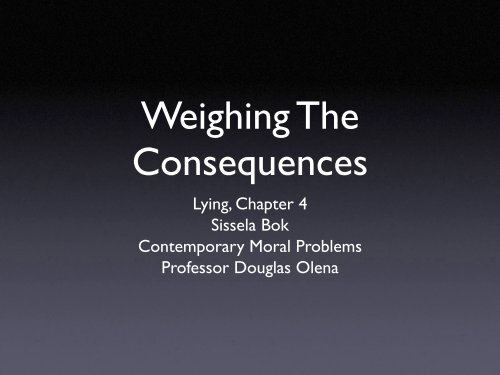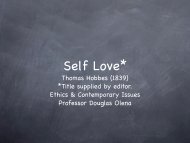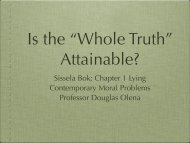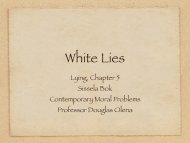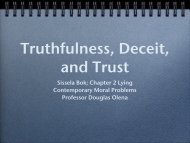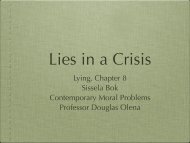Lying Chapter 4 - Olena's
Lying Chapter 4 - Olena's
Lying Chapter 4 - Olena's
Create successful ePaper yourself
Turn your PDF publications into a flip-book with our unique Google optimized e-Paper software.
Weighing The<br />
Consequences<br />
<strong>Lying</strong>, <strong>Chapter</strong> 4<br />
Sissela Bok<br />
Contemporary Moral Problems<br />
Professor Douglas Olena
•<br />
•<br />
<strong>Chapter</strong> Preface<br />
“What harm would it do, if a man told a good strong lie<br />
for the sake of the good and for the Christian church [<br />
…] a lie out of necessity, a useful lie, a helpful lie, such lies<br />
would not be against God, he would accept them.”<br />
Martin Luther<br />
Falsehood, take it by itself, consider it as not being<br />
accompanied by any other material circumstances, nor<br />
therefore productive of any material effects, can never,<br />
upon the principle of utility, constitute any offense at all.<br />
Combined with other circumstances, there is scarce any<br />
sort of pernicious effect which it may not be instrumental<br />
in producing. Jeremy Bentham
•<br />
<strong>Chapter</strong> Outline<br />
The Role of Consequences<br />
• Systems
The Role of Consequences<br />
•<br />
•<br />
•<br />
48 According to Erasmus forbidding all lies is<br />
contrary to common sense.<br />
“For utilitarians, an act is more or less justifiable<br />
according to the goodness or badness of its<br />
consequences.”<br />
“Their procedure for weighing moral choice is very<br />
similar to ways in which most of us do in fact<br />
approach many situations of moral conflict—close,<br />
therefore, to common sense.”
The Role of Consequences<br />
•<br />
•<br />
•<br />
•<br />
48 Sidgwick justifies lying based on the consequences<br />
of the lie in that particular case.<br />
49 “Utilitarianism generates no controversies over<br />
how to define lying.”<br />
“Utilitarianism simply requires an evaluation of<br />
courses of action, be they deceptive or not.”<br />
“In choosing whether or no to lie, we do weigh<br />
benefits against harm and happiness against<br />
unhappiness.”
The Role of Consequences<br />
•<br />
•<br />
•<br />
49 As soon as the questions become complicated the<br />
utilitarian method offers us no help. It becomes<br />
increasingly difficult to measure the consequences.<br />
Utilitarians are in as much conflict with other<br />
utilitarians over complex issues as anyone else.<br />
50 “A second reason to be wary of a simple-seeming<br />
utilitarian calculation is that it often appears to imply<br />
that lies, apart from their resultant harm and<br />
benefits, are in themselves neutral.
The Role of Consequences<br />
•<br />
•<br />
•<br />
50 The principle of veracity contradicts this facile<br />
treatment of lies.<br />
However for the utilitarian there is a way out of this<br />
dilemma.<br />
“There would be no need to see this presumption as<br />
something mysterious or abstract, nor to say that lies<br />
are somehow bad ‘in themselves.’ Utilitarians could<br />
view the negative weight instead as a correction,<br />
endorsed by experience, of the inaccurate and biased<br />
calculations of consequences made by any one liar.”
The Role of Consequences<br />
•<br />
•<br />
•<br />
51 Giving the money to the hospital instead of to the<br />
jockey club as promised.<br />
Though in this artificial scenario it is difficult to see<br />
any negative effects, the effects to the liar are<br />
underestimated.<br />
52 There are “risks to the liar of personal discomfort<br />
and loss of integrity, of a greater likelihood, however<br />
slight, of having to lie again to shore up the first lie;<br />
and of a somewhat diminished resistance to lying in<br />
the future.”
•<br />
•<br />
Systems<br />
52, 53 “Many have labored to erect… systems: to find<br />
a method by which to judge moral choice, or some<br />
single principle from which judgments can be<br />
derived, or some hierarchy among principles so as to<br />
resolve conflicts.”<br />
“In this way, methods, principles, and priority rules<br />
have sprung up, forming elaborate and hotly debated<br />
structures.”
•<br />
•<br />
Systems<br />
53 The problem with systems is that “when we have<br />
to make difficult moral choices they give us little<br />
help.”<br />
“Unfortunately, there is no evidence that systems, or<br />
overriding principles such as utility, or priority rules<br />
among principles, lead us to clear conclusions, much<br />
as the mind strains for such a result.”
•<br />
•<br />
Systems<br />
54 “Uncertainty and imprecision beset hard moral<br />
choices.”<br />
“I believe that any method, to be of help, should<br />
originate with the actual choices people make. It<br />
should have to look at the actual excuses they give,<br />
to themselves and to others, the arguments by which<br />
they appeal to principles, and the means by which<br />
they evaluate such arguments when others make<br />
them.”
•<br />
Systems<br />
55 “The questions which I shall ask of justifications<br />
advanced for different lies will, in the end, be<br />
questions of benefit and harm, questions asking why<br />
lying matters and what it does to individuals and to<br />
institutions.”
•<br />
Systems<br />
56 “A good place to begin is with the large category<br />
of white lies. It demonstrates both the futility of<br />
trying to rule out lies altogether and the shallowness<br />
of the intuitive utilitarian approach.”


